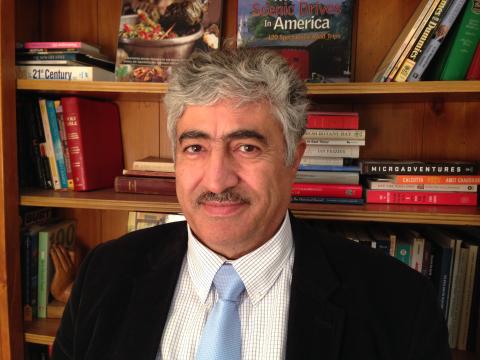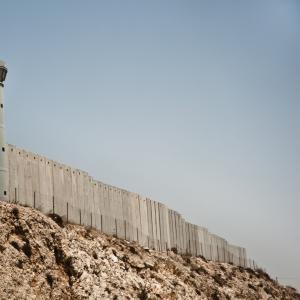
Jonathan Kuttab, a Palestinian Christian and human rights lawyer, is the co-founder of Nonviolence International, the executive director of Friends of Sabeel North America, and the author of Beyond The Two-State Solution.
Posts By This Author
Where an Olive Tree Burns
On a 100-acre farm southwest of Bethlehem, a Palestinian family lives out a commitment to reconciliation and nonviolence.
TENT OF NATIONS, a 100-acre farm southwest of Bethlehem in the West Bank, Palestine, has been in the Nassar family since their grandfather bought it more than a century ago. The family’s attempts to hold onto their land and prevent settlers from taking it over has been an ongoing battle—not only within the realm of the legal system. The Nassar family has had to physically defend their land, nonviolently, from repeated encroachments and attacks, which have included the burning and uprooting of their olive trees, the bulldozing of their plants, harassment and intimidation, and constant attempts to destroy the few physical structures they set up. The family’s persistence in remaining on the land has been one of the most remarkable examples of Palestinian sumud (or steadfastness) I have seen.
The story of their resistance is not just a political story of one Palestinian family’s assertion of its ancestral rights. The Nassar family members are devout Lutherans, deeply committed Christians who attempt to live out their faith in practice. They have used their property as a tangible example of their Christ-centered commitment to peace, reconciliation, and nonviolence.
Is the Two-State Solution Obsolete?
Israeli settlements have made compromise impossible. What's next for Palestine/Israel?
THE ISRAELI VICTORY in the 1967 war created a new reality in the region. Gradually, the outlines of a possible Grand Compromise began to take shape: Israel would return the land it captured in that war and in return the Palestinians and the Arab world would acknowledge Israel’s sovereignty over the 78 percent of Palestine that constituted the state of Israel on the eve of that war. This Grand Compromise, often referred to as “Land for Peace,” was enshrined in U.N. Resolution 242, and it gradually obtained the support of solid majorities among Palestinians and Arabs as well as Israelis and their supporters abroad. The two-state solution became the acknowledged goal for all well-meaning people as the ideal formula for a peaceful solution of the Arab-Israeli conflict. Those who rejected it from either side were viewed as maximalist hardliners and enemies to peace.
But as soon as the guns were silent in 1967, the issue of Jewish settlements in the newly occupied territories became a central and defining feature of the conflict between Zionism and Palestinian nationalism. International law allowed neither annexation nor the demographic shifts required to fulfill the Zionist ideal in terms of ejecting the non-Jewish population and moving Jews into the newly occupied territories. All such Zionist activity, therefore, needed to be carefully camouflaged and justified in secular, non-Zionist terms. It had to be justified either as a security measure, a temporary arrangement, or the creation of bargaining chips for the peace negotiations that were to come.
Palestinians who happened to be out of the area at the end of the war, or who left because of the war, were promptly blocked from returning. Israel started taking property all over the West Bank and Gaza under a variety of excuses and legal machinations and making that land available for Jewish settlers. Jewish settlers started moving in and creating exclusive Jewish enclaves that gave every indication of permanence. It is noteworthy that these settlements were not Israeli per se (Israeli Arab citizens were barred from them) but specifically and exclusively Jewish.
We Need a Radical Prophetic Position on Israel/Palestine
Simply reversing Trump's more extreme policies will not be enough.
THE TRUMP administration was an utter catastrophe for those who care about justice and peace in Israel/Palestine. U.S. policy was entrusted to right-wing settlement supporters such as Ambassador David Friedman and Jared Kushner and Christian Zionists such as Secretary of State Mike Pompeo.
The administration applauded—and legalized—settlement expansion, showing utter disdain for international law. They displayed blatant antagonism to Palestinians by moving the U.S. embassy to Jerusalem, cutting off financial aid to Palestinian hospitals and the U.N. Relief and Works Agency for Palestine Refugees, and closing the Palestinian Liberation Organization office in Washington. They capped it all by promoting fake “peace” alternatives, such as Trump’s disastrous “Peace to Prosperity” plan and the normalization agreements with Gulf countries. These policies aimed to appease the most hard-right policies of Israel and the eschatological fantasies of evangelical Christian Zionists, rather than seeking genuine peace or justice.
The Biden administration is likely to reverse some of these extreme steps. Biden has already signaled, however, that he would not reverse the embassy move, nor support any measures for conditioning aid to Israel based on its behavior. Biden’s policy will likely be marked by a return to the traditional policies of the Obama era, which included anemic objections to renewed settlement expansion, verbal support for a two-state solution, and vague references to international law, while resisting any pressure on Israel to actually comply with international law or create a sovereign Palestinian state.
Principles for Prophetic Action in the Middle East
Applying Christian principles to the Middle East conflict
AS CHRISTIANS concerned about peace and justice, this time of crisis in the Middle East provides us an opportunity to return to our principles, the “springs of living waters” for people of faith:
- We need to oppose both anti-Semitism as well as any form of discrimination and racism against Palestinian Arabs. Solutions that promote or tolerate discriminatory and racist institutions and practices should be forthrightly condemned. Settlements, illegal under international law and discriminatory against Palestinians, need to be rejected rather than tolerated and legitimized.
- We need to work for justice, which requires that we work for a solution that levels the playing field rather than seek a “realistic” approach that reflects the balance of power between the parties, necessarily favoring the strong against the weak.
- We need to seek reconciliation and peace between the parties, rather than assuming eternal hostility and enmity between the parties.
Broken Cisterns
Before it all fell apart earlier this year, and before this summer's carnage in Gaza, the Israeli-Palestine peace process was already fatally flawed.

Ryan Rodrick Beiler / Shutterstock
My people have committed two sins: They have abandoned me, the spring of living waters, and have dug for themselves cisterns, broken cisterns ... that hold no water.
—Jeremiah 2:13
IN THE LATE 1980s and early '90s, Palestinians rose up against the Israeli occupation of Palestinian territories in what became known as the First Intifada. Instead of acceding to the demands for justice by the "children of the stones," the response was a process of talks that led to the signing of the Oslo Accords in 1993.
The “peace process” engaged the leadership of the PLO (Palestine Liberation Organization)—then weak, corrupt, exiled, and with little vision or support—in what turned out to be a worse-than-fruitless effort that led to the perpetuation of the occupation and suffering of the Palestinian people, and which made a just peace even further away.
The process was intriguing to many of us in the peace and justice community, and it successfully co-opted us, as it co-opted the Palestinian leadership, but this process entailed both the abandoning of principled positions and the adoption of the Oslo system, a broken system that could not possibly deliver what it promised.
We were treated to a new language by Israel and the U.S., which seemed at first blush to adopt our own slogans: Where Palestinians were constantly complaining of Israel’s refusal to acknowledge them—its demonization of their leadership, and trying to have Jordan or other local collaborators speak on their behalf—the new process brazenly invited the PLO itself and its leader Yasser Arafat to participate as the “sole legitimate representative of the Palestinian people.”



